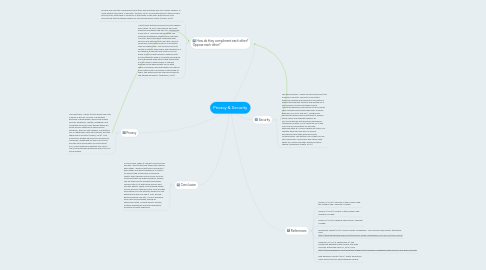Privacy & Security
作者:Brandon Ponce

1. Privacy
1.1. The first topic I chose to talk about from this module is privacy. Privacy is important because of how widely used social media such as Facebook, Twitter, Instagram and Snapchat are used. Even though there are some privacy features on these social networks, they are not flawless. The bottom line is: what goes onto the Internet, will stay there and it is public (Millard, 2016). This impacts us greatly because for example on Facebook, depending on who can access and see your information or posts about you, could determine whether you land a job if the employer researches about you on social media.
2. How do they compliment each other? Oppose each other?
2.1. Privacy and security compliment each other because they are very closely related: "A close partner to privacy is security" (Millard, 2016). One objective that I think privacy and security both have in common is the safety of the user. Both privacy and security are the top things people are concerned about online (Millard, 2016).
2.2. I don't think that privacy and security oppose each other. At first I didn't know the exact difference between the two so I researched more into it. I found an article titled The Difference Between Data Privacy and Data Security, which explains: "Although data privacy and data security are often used as synonyms, they share more of a symbiotic type of relationship. Just as home security systems protect the privacy and integrity of a household, a data security policy is put in place to ensure data privacy. Data security ensures that the data is accurate and reliable and is available when those with authorized access need it. Data privacy is suitably defined as the appropriate use of data. When companies and merchants use data or information that is provided or entrusted to them, the data should be used according to the agreed purposes" (Anderson, 2013).
3. Conclusion
3.1. In conclusion, when it comes to privacy and security I don't think that they both oppose each other. I believe that they compliment each other and work together as a system to achieve the similar goal of personal safety. Even though online crimes such as fraud and theft are huge problems, people can do their best to prevent themselves falling victim to it with good privacy and security habits. These include being aware of your privacy settings online such as what information you are posting, where you are posting and who can see it. Also, having good password security, such as avoiding your name and birthday, having an uppercase letter, number and/or symbol, multiple passwords and good password recovery security questions.
4. Security
4.1. The second topic I chose to talk about from this module is security. Security is important because valuable and personal information is passed through the Internet and posted on it. For example, online purchases require important personal information such as credit card numbers and billing addresses. Another example is in 2010 and 2011, Google and Facebook tracked online activities of people using Safari and Internet Explorer by circumventing an anti-tracking mechanism (Workplace Safety, 2012). Because of all the free flow of information on the web, approximately 8.1 million people are victims of identity theft per year and 1.6 million households have their bank accounts compromised. The bottom line is that you are not safe online; consumers don't have legal rights to control how their personal data is shared (Workplace Safety, 2012).
5. References
5.1. Millard, D (2016). Security in the Modern Age. the Modern Age. Sheridan College.
5.2. Millard, D (2016). Privacy in the Modern Age. Sheridan College.
5.3. Millard, D (2016). Keeping Safe Online. Sheridan College.
5.4. Workplace Safety (2012). Online Safety Infographic: You Are Not Safe Online!. Retrieved from http://www.atlantictraining.com/blog/online-safety-infographic-you-are-not-safe-online/
5.5. Anderson, B. (2013, September 9). The Difference Between Data Privacy and Data Security. Retrieved April 07, 2016, from http://blog.eiqnetworks.com/blog/bid/313892/The-Difference-Between-Data-Privacy-and-Data-Security
5.6. Pew Research Centre (2014). What Americans Think About Privacy. Pew Research Centre.


